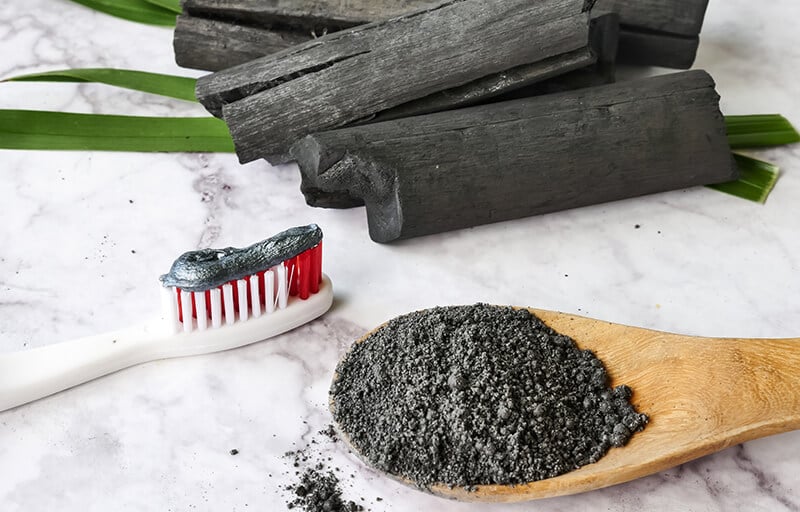It’s the latest DIY dental trend: whiten your teeth by brushing them with midnight-black activated charcoal. While the process may produce good results for some people, dentists are warning that there is a high chance that the process will result in badly stained, damaged teeth.
What Is Activated Charcoal?
Activated charcoal is not the stuff you use in your backyard grill. It’s carbon that was treated with an oxidizing agent, which produces a fine dust that has absorbent qualities. It’s been used to treat food poisoning, drug overdoses and other health issues that require a quick mop-up of whatever toxic substance someone has ingested. Activated charcoal is, in fact, pretty amazing stuff – it can absorb almost half (47%) of the substances in a stomach. It doesn’t target the bad stuff, though, it just sucks up whatever is in your stomach so ingesting it can have side effects such as severe dehydration.
Its sudden popularity as use as a tooth whitening agent seems to be based on activated charcoal’s potential ability to absorb substances that stain your teeth such as coffee, wine, and plaque. But the potential effects – positive or negative – haven’t been properly evaluated. Do you really want to experiment with your teeth? There are equally affordable options available that provably do brighten your teeth without damaging them in the process.
See how much you can save with a dental savings plan.
Use our calculator below >
Does Activated Charcoal Damage Teeth?
Dentists believe that activated charcoal may cause the enamel on teeth to deteriorate, which typically leads to dental erosion and decay.
Dental erosion is sometimes called demineralization. It starts with the softening of the enamel on your teeth, and can progress to impact the underlying dentin. The end result can be significant structural damage to your teeth, which can lead to tooth loss.
Erosion is often caused by acids in drinks and foods, or from regurgitated stomach acid as it passes through the mouth. Abrasive substances also wear down and weaken tooth enamel, and activated charcoal’s abrasive levels have not been evaluated to determine if the substance is safe to use on teeth.
Your teeth are (hopefully) covered by enamel, comprised of tiny, tightly-packed rods of minerals. Tooth enamel is the toughest tissue in the human body. Despite all this, tooth enamel can be damaged by forceful brushing. And since enamel has no living cells, the body cannot repair enamel if it is damaged. So it’s especially important to protect it from erosion.
Enamel is critical to the health of your mouth. It helps protect teeth from damage that can be causing by chomping, biting, crunching, and grinding. It also acts as a sort of insulator to protect teeth from heat and cold foods and liquids, and acidic foods and drinks such as fruit juice. Damage your enamel and you leave your teeth open to decay and infection. At the very least, enamel erosion leads to super-sensitive teeth that ping you with shooting pains whenever you consume something that is an irritant. Many things irritate eroded teeth – from a cold glass of orange juice, to a warm beverage, tomato sauce, salsa, pickles … the list is long.
Damaged enamel also leads to less-than-white teeth, as the semi-translucent enamel filters the color of the underlying dentin layer. Dentin ranges in color from a whitish-gray to pale yellow. Damaged enamel results in darker teeth, which often can only be fixed with expensive restorative treatments such as bonding or overlays.
It’s also possible that if you use activated charcoal to brush teeth with damaged enamel – and one out of every five Americans does have symptoms of dental erosion – you may end up with black or gray stains on your teeth. The charcoal may seep through damaged enamel and stain the inner layer of your tooth.
Better Options For A Brighter Smile
Want whiter teeth? Head to your dentist. You may be able to brighten your teeth using over-the-counter products, but a professional whitening treatment typically provides enhanced results. Talk to your dentist to see which type of treatment is best for you.
In Office: Your dentist will protect your gums with a desensitizing gel or shield before applying a peroxide gel to your teeth. The solution is then activated by exposure to a high-intensity light. Expect to spend a half-hour to an hour in the dentist’s chair. You may need more than one appointment. Average cost is $450-$600.
At Home: Your dentist will custom-fit a set of “whitening trays,” (flexible molds which you’ll place over your teeth) or will provide you with a kit that contains the trays and a peroxide gel. The whitening product used is weaker than the one utilized in the dentist’s office, but more powerful than an over-the-counter product. Typically, you’ll wear the trays for 4-8 hours daily over the course of ten days. Average cost is $400-$500.
Over-The Counter treatments, such as bleaching strips or whitening kits, can be an effective budget choice if your teeth are already white and healthy. Cost is under $100.
Affordable Dental Whitening Treatments
Dental insurance typically does not provide coverage for cosmetic treatments such as whitening. But dental savings plans, an alternative to traditional dental insurance, often do provide an average discount of 20% off professional whitening treatments from a nationwide network of dentists.
Dental savings plans also provide savings of 10%-60% on a wide variety of preventive dental care —including cleanings, checkups and x-rays—and restorative treatments. Yes, you can save on porcelain overlays, crowns and dental implants among other treatments that will give you a smile you can be proud to show off. And there’s no annual maximum spending limits, waiting periods, restrictions on getting discounts to treat preexisting dental problems or any of the other hassles typically associated with dental insurance.
Ready to make your smile the best that it can be, at a price you can afford? Then find out more about dental savings plans at dentalplans.com.

 Login
Login